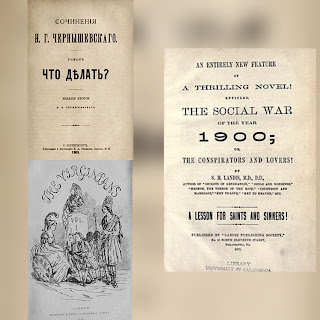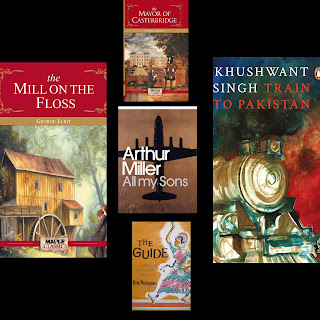In this blog you can find some questions and answers connected with Aristotle's Poetics, contribution and theory and Plato's theory, charges, contribution and objections and other stuff connected with Plato and Aristotle.
Plato:-
Plato (428/429 - 347 BCE ) was an Athenian philosopher. You were from an aristocratic family. He is one of the most powerful figures in the history of ancient Greek and western philosophy. Plato was a student of Socrates - a famous philosopher. He was much influenced by the thoughts of Socrates that could be the reason Socrates is the main character in major works of Plato.
These are some works by Plato that include Socrates in his works as talk or as conversation.
Plato's theories:-
Theory of Forms and The Theory of Ideas:-
It is a philosophical theory which predicts that the physical world is not as real or true as timeless, absolute, and unchangeable ideas. Plato believed that reality existed beyond normal perceptions of the world. What we perceive around us is a shadow of this truth.
This theory maintains that two distinct levels of reality exist:- the visible world of sights and sounds that we inhibit and the intelligible world of forms that stands above the visible world and gives it being. Plato begins with the premise that intellectual truth is truer than physical truth.
Theory of Mimesis (Imitation):-
In this theory of Mimesis, that all art is mimetic by nature, is an imitation of life. Art imitates ideas and so it is an imitation of reality. He gives an example of a carpenter in a chair. The idea of 'chair' first came into the mind of a carpenter. He gave physical shape to his idea out of wood and created a chair. The painter imitated the chair of the carpenter in his picture of the chair. Thus, the painter's chair is twice removed from reality. That is why he gives first importance to philosophy and said that philosophy deals with the ideas whereas poetry deals with illusion.
So according to Plato, philosophy is superior to poetry.
Plato's Views on Poetry and Poets:-
Plato was a moralist. He believed in art for life sake and art for art's sake. Plato was a supporter of realism. He was in favor of didactic literature and art. In his ideal state there is no place for poets, tragedians and comedians. Is it that:-
"Let them be crowned with fillets - let perfumed oil be poured on their heads - but they must be sent on another City."
This theory is a controversial theory. Aristotle, Plato's disciple, opposed the theory of Plato. Aristotle advocates poetry as it is mimetic in nature. According to Aristotle,
"Poetry is an imitation of an action any stool of enquiry is neither philosophical nor moral."
He examines poetry as a piece of art and not as a book of preaching or teaching. When Plato banished the poets from his fictional republic, a quarrel was taken up between philosophy and poetry that has continued to the present. Plato objected to poetry on the three grounds in his work The Republic:- educational, moral and philosophical.
Aristotle:-
Aristotle was born in 384 BCE and died in 323 BCE. He was a philosopher, poet and writer. He was a student of Plato. At the age of 18, he joined Plato's academy. Letter on He became the tutor of Alexander the great. Most of his works were composed while he was in his academy between 335 to 323 BCE in Athens.
The Poetics:-
Poetics is the science of poetry, the art of creating poetry. Poetry was used in a good sense by Aristotle; it includes drama, music, painting, arts, etc. Poetics has been Central document in the study of aesthetics and literature for centuries especially the renaissance and today's scholarly circles.
The most important thing that Aristotle said is that he tells us how a child learns right from his birth through imitation. So Imitation is ingrained within us and this imitation has to be used creatively and intellectually by the imaginative artist.
According to him life can be duplicated through character, emotion or action. Poetry attempts imitate life through rhythm, language and harmony. For him the poet is a creator and the poet represents life through his sublime skills of observation. And the kind of poetry that an artist or a poet can produce depends on what is the nature of imitation. The nature of imitation depends upon the object, mode and medium of imitation. The major object of an imitation is a man in action. It is the real skill of the poet that enables him to present man different from what they are, and at the same time to be true to life.
Tragedy:-
Aristotle dismisses Plato's concept of art and establishes that the art is useful and good. Plato had banished all poets from his ideal state but Aristotle re-established the use and value of poetry. He defended poetry as a medium of imitation.
Imitation:-
- Noble Qualities ( Epic/Tragedy )
- Lower Qualities ( Satire/Comedy )
According to Aristotle, Tragedy is the most refined version of poetry that deals with the imitation of lofty matters. It is the ultimate form of our inner delight in imitation. Tragedy is in dramatic form or its medium is drama and tragedy is not to tell but to show or perform. Tragedy is more philosophical than history.
Characteristics of Tragedy:-
- It is mimetic.
- It is serious.
- It tells the full story of an appropriate length.
- It contains rhythm and harmony.
- It is performed rather than narrated.
- It arouses feelings of pity and fear and then purges these feelings through catharsis.
- We may relate Aristotle's concept of catharsis with Bharta's the Natyashastra because he also included Rasa like pity and fear among the nine talks about.
- He talks about 'Hasy' that is comedy.
- He talks about 'Karuna' that is pity.
- He talks about 'Vira' that is heroic.
- Because they call all these as permanent emotions.
According to Aristotle a successful tragedy is constituted by six components:-
- Plot
- Character
- Thought
- Diction
- Song
- Spectacle
1-question:- how far do you agree with Plato's objection to freedom of expression and artistic liberty enjoyed by creative writers? Name the texts (novels, plays, poems, movies, TV shows, etc which can be rightfully objected and banned with references to Plato's objection).
Answer:-
In Plato's theory of mimesis he levies some charges on the poet and poetry.
- Poetry is inspiration not rational.
- It is neither the correct nor the method for finding out 'truth'.
- Poetry is written in a state of tantrum.
- Morally harmful depiction or misrepresentation of Greek gods.
- Poets have no place in an ideal state.
In his famous text Ion, he said that the poet is not the proper person who can have every kind of knowledge, for example, who knows better to cook dishes than a chef or a poet and therefore it is dangerous to follow poets who then spread such incorrectness and thereby they corrupt this all of the period.
He said that poets are imitators, they are mere copiers and therefore it is not right to follow poets. They are immoral because they further immoral depiction and immoral representation.
Poets are possessed.
He further said that poets are liars because of two primary reasons:-
- The gods are represented in a very false manner that should remain as gods better than human beings.
- He believes that the ultimate real world is an unchanging World. He was shocked how human beings can depict a certain kind of world which is like the mortal world, a changing world.
So, Plato was right in some charges that he Levied on the poets. It's true that Poets write their poetry in full of enjoyment and excitement and sometimes they forget how unreal they wrote. Aristotle argued that poetry is only for pleasure; there is no purpose of poetry to teach moral lessons to society and people. There is only aestheticism in poetry writing and reading.
These are some movies, advertisements, and works that make no sense and are considered useless one.
Some poetry, novels, movies, TV shows are against Plato's theory like friends (tv series), short stories by Leo Tolstoy, plays by Shakespeare, poetry by Rabindranath Tagore, Wordsworth, Shelly and so on.
2-question:- With reference to the literary texts you have studied during BA program, write brief note on the texts which followed Aristotelian literary tradition (i.e. his concept of tragedy, catharsis, tragic Hero with hamartia etc)
Answer:-
In my BA syllabus I have studied 7 texts that follow Aristotelian literary tradition.
- All for love by or The world well lost a tragedy by John Dryden
All for love or The world well lost a tragedy by John Dryden was published in 1677 and it's a heroic drama. This drama is dedicated to the Earl of Danby. It is a tragedy written in blank verse. It is an affiliated imitation of Shakespeare’s Antony and Cleopatra, and focuses on the last hours of the lives of them. The end of this drama has a tragic end when Antony and Cleopatra die. There are so many times when catharsis presents in this drama whenever Antony and Cleopatra meet. The hero of this drama and heroine also dies in the end. With a following of hamartia this drama runs towards the end.
- Julius Caesar by William Shakespeare
Julius Caesar is a history play and tragedy by William Shakespeare. It was First performed and published in 1599. This play is divided in 5 Acts. This play runs around the tragic Hero Julius Caesar. Play starts with Julius Caesar's entry after he came out winning the war and every person of the town gathered to celebrate his Triumph. With the flow of hamartia hero of the play leads to the tragic end and dies cause of sword attack by antagonist and his fellow friend.
These are some other texts that also included Aristotelian literary tradition in a sense that was in the BA syllabus of mine.
3-Question:- With reference to the literary texts you have studied during BA program, write a brief note on the texts which did NOT follow Aristotelian literary tradition (i.e. his concept of tragedy, catharsis, tragic hero with hamartia etc.)
Answer:-
In my BA syllabus I have studied 10 texts that did not follow Aristotelian literary tradition.
As you like it by William Shakespeare
As you like it it's a pastoral comedy by William Shakespeare. It was written in 1599 and first published in the First Folio in 1623. As You Like It follows its heroine Rosalind throughout the play. Shakespeare made the heroine of the play, kinda a hero in this comedy. There was a time in play when Rosalind and Celia became boy for living in the forest. This play made comic 'hasya' rasa. In the end of the play everyone gathers and sings a song and happy ending. So this play didn't follow Aristotelian literary tradition.
- The clerk's tale by geoffrey chaucer
The clerk's tale is the first tale of Group E in Geoffrey Chaucer's The Canterbury Tales. The
Canterbury tales is a collection of twenty-four stories that runs to over 17,000 lines written in Middle English by Geoffrey Chaucer between 1387 and 1400. The Canterbury tales is great contribution in the English literature by geoffrey chaucer. Chaucer's intention was to write four stories from the perspective of each pilgrim, two each on the way to and from their ultimate destination, St. Thomas Becket's shrine. but it couldn't be completed Cause of his death in 1400. So this collection of stories also not considered as a tragedy and didn't follow Aristotelian literary tradition.
These are some Texts that didn't follow Aristotelian literary tradition and also appeared in my BA syllabus.
Note:-
I wrote this blog as per my information and knowledge, yes, some of the informations are imitated from other sources so if you find this blog informative that's made my day better, thank you☺️.
Words:- 1989












No comments:
Post a Comment
If you have any suggestions and doubts please let me know☺️